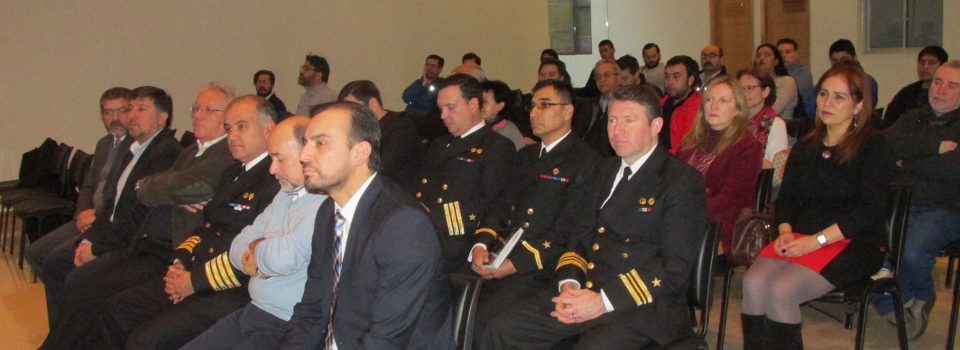Seminar “The role of IFOP and the contribution of fishing and aquaculture to sustainable development at Magallanes region.”
June 21st, 2016
Address- Magallanes: In Punta Arenas, at Contraloría Regional auditorium, a Seminarium was carried out by IFOP, with the purpose of bringing scientific research in the area of fishing and aquaculture closer to the community.
The following people were present during the activity: Oscar Ortiz, Maritime Governor of Punta Arenas, Pedro Herrera, Port Captain of Punta Arenas, Roberto Sahr and Francisco Ros, Regional Counselors, Carlos Ríos, Director of Instituto de la Patagonia, Isa María Muzio, Regional Representative of Corfo; Researchers of CEQUA and Universidad de Magallanes, Anelio Aguayo of Instituto Chileno Antártico, students of Maria Bethy High School, professionals of IFOP, Dirección Zonal de Pesca, Servicio Nacional de Pesca and general public.
Leonardo Núñez, Executive Director of IFOP, explained the objective of the activity, “to explain Magellan community about regional research projects being carried out by IFOP at present; the seminar is being held under our institutional anniversary framework. 52 years dedicated to research; during 2016 our challenge in Magallanes is being able to generate strategic alliances with other institutes in the region.”
Erik Daza, head of IFOP in Magallanes, said “this seminar stems from the need to disseminate the role of IFOP to the Magellan community. For more than 40 years, IFOP has been carried out research initiatives that have enabled the authority to establish measures of administration and management in emblematic fisheries in the region. It is imperative to strengthen regional strategic research. Magallanes has the opportunity to plan a sustainable manner for these economic axes, for which a coordinated effort with the Regional Government and research institutions work is fundamental. As IFOP Magallanes, we have worked in the organization of this activity, planning to enhance the dissemination of our work, and so project our work in the region.”
Robert Sahr, Regional Director and president of science committee of Core, added “I think it’s great the IFOP activity is doing by informing the community about all its activities; is not normal and very common for institutions to disclose their work, so I find this very positive. The most important is to have a strategic partnership between the Regional Government and the Instituto de Fomento Pesquero in all aquaculture and fisheries issues being investigated by IFOP.”
Francisco Ros, Regional Counselor said “I feel this activity as very positive. Besides, we have had approaches with IFOP, where we have asked his opinion on research issues in the region, and because of the concern of some counselors about the red tide and all what happened in Chiloé. Today, I’m very happy at this fantastic activity, and with all we are being reported about IFOP research carried out in the region.”
Aguayo Anelio of Instituto Chileno Antártico said “I congratulate the organizers for the excellent presentation of the work. The IFOP here in the region plays an important role as the fisheries depend on scientific research, and the same for aquaculture.”
The program of the Seminar
History and role of IFOP during the research, Leonardo Nuñez, Executive Director of IFOP
Aquaculture Research Division, What have we done during the last five years?, Leonardo Nuñez, Aquaculture Research Division Head
Research in Fisheries of Magellan region, current and future challenges. Erik Daza, IFOP Head of Magellan region.
And the master class “Something is happening in the south of Chile (39° -55°): Alexandrium catenella and paralyzing poison during the last 45 years, in charge of Leonardo Guzmán.
